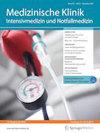[ROSE 概念:重症监护医学中的现代液体管理]。
IF 1.3
4区 医学
Q2 MEDICINE, GENERAL & INTERNAL
Medizinische Klinik-Intensivmedizin Und Notfallmedizin
Pub Date : 2024-11-01
Epub Date: 2024-10-09
DOI:10.1007/s00063-024-01193-1
引用次数: 0
摘要
ROSE 概念是 "复苏、优化、稳定和撤离 "的首字母缩写,它根据脓毒性休克的病理生理学描述了液体疗法的各个阶段。在前两个阶段,必须根据临床和血液动力学参数积极进行输液治疗。在稳定阶段,休克和微循环损伤得到恢复,从而能够在第四阶段也就是最后一个阶段消耗超负荷的液体。最终,需要重新获得充盈血量,从而恢复间质水肿和器官功能障碍。本文章由计算机程序翻译,如有差异,请以英文原文为准。
[The ROSE concept: modern fluid management in intensive care medicine].
The ROSE concept, which is the acronym of resuscitation, optimization, stabilization and evacuation, describes the phases of fluid therapy, based on the pathophysiology of septic shock. During the first two phases, aggressive fluid therapy that is guided by clinical and hemodynamic parameters is mandatory. During the stabilization phase, recovery from shock and microcirculatory injury occurs, which enables the depletion of fluid overload in the fourth and final phase. Ultimately, euvolemia needs to be regained, which reverts interstitial edema and organ dysfunction.
求助全文
通过发布文献求助,成功后即可免费获取论文全文。
去求助
来源期刊

Medizinische Klinik-Intensivmedizin Und Notfallmedizin
MEDICINE, GENERAL & INTERNAL-
CiteScore
2.60
自引率
9.10%
发文量
93
审稿时长
6-12 weeks
期刊介绍:
Medizinische Klinik – Intensivmedizin und Notfallmedizin is an internationally respected interdisciplinary journal. It is intended for physicians, nurses, respiratory and physical therapists active in intensive care and accident/emergency units, but also for internists, anesthesiologists, surgeons, neurologists, and pediatricians with special interest in intensive care medicine.
Comprehensive reviews describe the most recent advances in the field of internal medicine with special focus on intensive care problems. Freely submitted original articles present important studies in this discipline and promote scientific exchange, while articles in the category Photo essay feature interesting cases and aim at optimizing diagnostic and therapeutic strategies. In the rubric journal club well-respected experts comment on outstanding international publications. Review articles under the rubric "Continuing Medical Education" present verified results of scientific research and their integration into daily practice. The rubrics "Nursing practice" and "Physical therapy" round out the information.
 求助内容:
求助内容: 应助结果提醒方式:
应助结果提醒方式:


